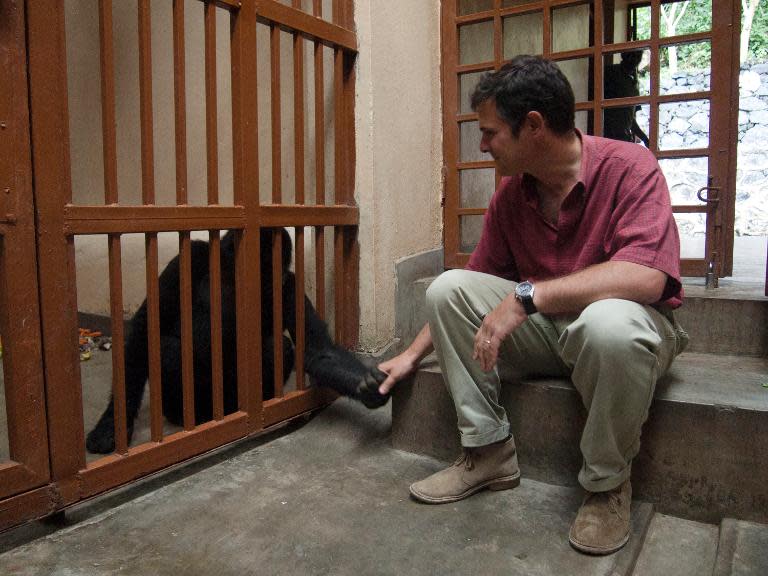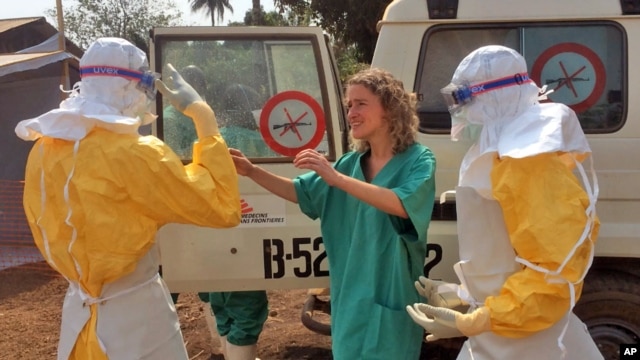Ebola Flares in Western Gorilla, Chimp Stronghold
James Owen for National Geographic News
April 4, 2005
http://news.nationalgeographic.com/news/2005/04/0404_050404_ebolagorilla.html
The deadly Ebola virus has spread to the world's most important stronghold for western gorillas and chimpanzees, according to a new survey of central Africa.
Researchers behind the surveys say urgent action is needed to protect the threatened primates from becoming infected by the lethal virus.
At meeting in Washington, D.C., last month, conservationists and ape experts learned that Ebola has taken hold in Odzala National Park in the Republic of the Congo.
"Odzala is being hammered," said Peter Walsh, an ecologist at the Max Planck Institute for Evolutionary Anthropology in Leipzig, Germany. "Before the arrival of Ebola, this park held the single largest population of gorillas and chimpanzees in the world."
The warning follows a year-long survey in the region by the Programme for Conservation and Rational Utilization of Forest Ecosystems in Central Africa (ECOFAC), a conservation initiative sponsored by the European Union.
Ape experts said they fear that Ebola could infect all remaining large populations of great apes in western equatorial Africa within the next five years. The region encompasses Cameroon, Congo, Gabon, Equatorial Guinea, and the Central African Republic.
"Immediate action is required to determine how best to ensure this doesn't happen," said Diane Doran, a gorilla researcher at Stony Brook University on Long Island, New York.
Conservationists said urgent action may stop the virus from spreading. Steps include: patrolling riverbanks to cut downed trees, which apes use as natural bridges, and pressing ahead with experimental Ebola vaccines to inoculate wild great ape populations within three to five years.
Some experts say intervening to stop the spread of Ebola in great apes may also help protect human populations in the region. Most recent outbreaks of the virus in humans have been traced back to the handling of infected ape carcasses.
Ebola River
The Ebola virus is named after the Ebola River, site of the first known outbreak of the disease in 1976. The highly contagious virus causes fever and hemorrhaging that often proves fatal.
The most recent Ebola outbreak in western equatorial Africa flared in the Republic of Congo. First detected in 2002, the virus spread to Lossi Gorilla Sanctuary, some 9 miles (15 kilometers) southwest of the much larger Odzala National Park. Odzala spans 5,250 square miles/13,600 square kilometers.
Walsh, the Max Planck Institute ecologist, noted that it is hard to pinpoint the number of apes the virus has claimed. But he said, "Based on typical rates of mortality in affected areas and the spatial extent of the impact zone, something in the range of 20 to 35 percent of the world's western gorilla population has died from Ebola over the last decade."
"This translates into tens of thousands of animals," he said. "There has also been a heavy impact on common chimpanzees."
The ecologist said he is most disturbed by the fact that Ebola is taking a heavy toll in the remote national parks of western equatorial Africa, the very same parks that are central to great ape conservation plans for the region.
Minkebe National Park in northern Gabon is home to the world's second largest ape population after Odzala National Park. Minkebe is thought to have suffered an ape decline of more than 90 percent in the mid-1990s, due to Ebola.
Reserves like Minkebe and Odzalla are intended to provide great apes sanctuary from logging and the bush meat trade in wild animals, a practice that has seriously impacted great ape and other animal populations throughout central Africa.
By some estimates, bush meat hunters in Africa cull about a billion dollars (U.S.) worth of wild animals from African forests. The animals are sold as meat, often in urban markets far removed from the animals' habitat.
Vaccine Hope
Regarding the current Ebola outbreak, conservationists and ape experts who gathered in Washington, D.C., last month to discuss the crisis proposed a number of measures to prevent the virus from spreading further.
Actions include vaccinating wild great ape populations against Ebola and using natural barriers to prevent infected great apes from mingling with healthy populations.
Studies have suggested that rivers may have stalled the rampant spread of Ebola among ape populations in the past, because gorillas and chimpanzees are reluctant to cross open water. Researchers say work to clear small rivers of overhanging trees in rain forests may block the virus from spreading.
There are also hopes that a vaccine will soon become available for apes.
Two Ebola vaccines have been successfully tried in laboratory monkeys. But researchers caution that work remains to develop an effective, real-world vaccine for wild apes.
Field studies will be necessary to determine the best method for administering a vaccine, they say. Options include darting apes with vaccine-filled syringes and using bait laced with an oral vaccine.
"If adequate resources were available, much of the necessary background work could probably be completed in the next year or two," Walsh said. "It would then not be unrealistic for vaccination to commence in three to five years."
"However, if resources are lacking, progress will be incremental, and we may not have a vaccine in time to protect other large ape populations," he said.
Host Species
There are four known strains of Ebola in the world, three of which are found in Africa. The Zaire strain is the one blamed for the current epidemic in central Africa. The virus's main host in the wild has yet to be confirmed, though bats are the leading suspects. -
Walsh says knowing the reservoir host (a species that carries and spreads a virus, without succumbing to it) isn't vital. "You just vaccinate apes continuously, as we do to protect domestic dogs from rabies," he added.
The ecologist said other interventions have been considered should the virus spread further. Steps include: culling suspected Ebola virus reservoir species, implementing artificial birth control in suspected reservoir species, moving healthy apes to virus-free zones.
But for now, the consensus among most scientists is that the best means to prevent Ebola from spreading is to vaccinate great apes and to clear rivers of downed trees so that infected apes cannot cross natural river barriers.
What is certain, scientists say, is that a solution to the Ebola crisis is desperately needed. Otherwise, said Max Planck Institute director Christophe Boesch, the main remaining gorilla populations could be devastated.
"We will be left with a sparse patchwork of apes, many of them living outside of formal protected areas," Boesch warned. "These remnant patches will be too widely scattered to efficiently protect from the ravages of commercial hunting and too small to have good long term viability."

